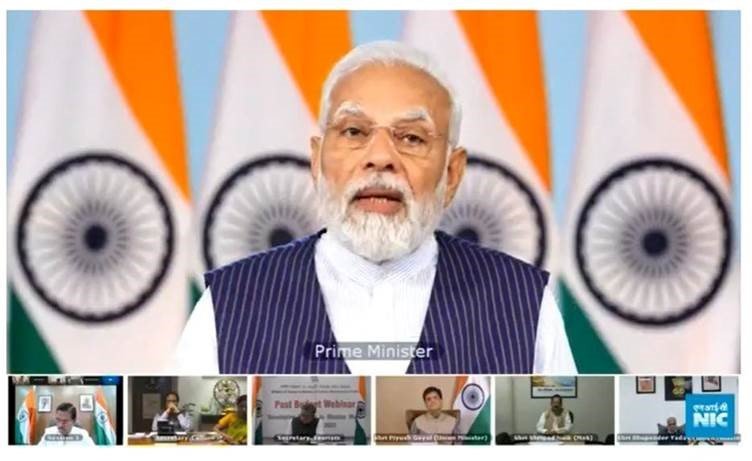Tourism has always been a part of our social and cultural civilization: PM
The biggest employment-generating sector could very well be the tourism sector after the textiles industry: Shri G.K Reddy
Prime Minister Shri Narendra Modi, today addressed the post-budget webinar on “Developing Tourism in Mission Mode’, organized by the Ministry of Tourism. This is a series of post-budget webinars being organized by the Government with an aim to brainstorm ideas for effective implementation of the initiatives announced in the Union Budget-2023.
In his address, Prime Minister, Shri Narender Modi said that tourism has always been a part of our social and cultural civilization. India`s tourism comprises multiple aspects and can be promoted as coastal tourism, wildlife tourism, adventure tourism, cultural tourism, beach, mangrove, Himalayan, spiritual tourism and others. This year`s Budget prioritizes the development of tourist destinations in a holistic manner and it aims to develop at least 50 tourism destinations which can then be promoted globally. He stated that with the development of tourist amenities at destinations, the tourism sector will definitely flourish. As an example, with the reconstruction of the Kashi Vishwanath Temple corridor, 7 crore tourists have visited the city. Kashi Vishwanath Dham and Kedarnath Dham are live models highlighting the fact that ease of travelling encourages increased tourist footfall. Further technological advances and digitalization with better infrastructure and cleanliness will help to boost tourism. Apps for tourists and digital connectivity can be modernized to make them accessible to all tourists. There has been an increase in the number of foreign tourists visiting India. With a proper strategy to promote India globally, footfall is also bound to increase substantially. The Union Budget 2023-24 has allocated an amount of Rs 2400 crores to the Ministry of Tourism.
Prime Minister described Destination Weddings as an upcoming niche and emerging sector which had the potential for increasing tourism. The exchange of intercultural wedding rituals in the States can boost the sector further. Further events like global Conferences and sporting events have the potential to create a stupendous level of infrastructure. He cited the example of the recent FIFA World Cup 2022, which benefitted Qatar`s economy massively.
The Post Budget Webinar had 6 breakout sessions deliberating on Destination Centric Approach for Tourism Development, Convergence – The Power of Collaboration, Strengthening Public Private Participation in Tourism Sector, Driving Innovation and Digitalization in Tourism Sector, Impacting lives at the grass root level through Tourism and Cultural Heritage for Promotion of Tourism. The sessions saw active participation from different panellists from State, Central Ministries as well as Industry associations, District administrations, local bodies, experts in the field of tourism and hospitality, Invest India etc.
Speaking at the concluding session, Minister of Tourism, Shri G. Kishan Reddy thanked Prime Minister for showing the path for developing the tourism sector in mission mode as well as all the panellists and speakers for their suggestions and ideas to overcome the challenges and move towards implementation of the budget announcements. He stated that the biggest employment-generating sector could very well be the tourism sector after the textiles industry. The government of India, state governments, private stakeholders and civil society should closely work together to promote the tourism industry of the country. This sector is one of the sectors to generate maximum employment with the least capital investment, he said.
Secretary Tourism, Shri Arvind Singh on the occasion said that this year’s budget has given us a new vision for tourism development and it focuses on the promotion of tourism in mission mode, with the active participation of states, the convergence of government programmes and public-private partnerships. He also said that the budget proposes the facilitation of tourism infrastructure and amenities in border villages under the Vibrant Village Programme and encourages setting up a Unity Mall in the state capital or most prominent tourism centre or the financial capital for promotion and sale of their own ODOPs (one district, one product), GI products and other handicraft products, and for providing space for such products of all other states.
Shri Arvind Singh highlighted the fact that this year’s budget advocates a shift from department centric and scheme-centric approach to a destination-centric approach for planning, development and management of tourism
On the occasion Secretary of Culture, Shri Govind Mohan said that the Ministry of Culture has the basic objective of preserving, disseminating and also promoting Indian Culture and Indian culture is a very rich repository of ideas, places, facets of our heritage, of performing arts, visual arts, monuments which are of immense interests to the tourists not only within India but also abroad.
He also informed that to begin with, the Ministry of Culture will develop 5 big cultural spaces in India and going forward more spaces will be developed. These are the places where the tourists will be exposed to the best of Indian music, dance performances, book reading, painting competitions, quizzing competitions and other cultural activities in an integrated fashion.
Secretary Culture also highlighted the importance of technology and said that by using AI, VR and other digital techniques the monuments can be developed as more interesting places for the younger generation. He also said that PPPs have the potential to create value around these monuments and make them living examples of the wealth and beauty India offers.
A number of suggestions and ideations emanated from the deliberations, which are broadly as follows:-
a. Planning of the destinations is crucial for the development of the destinations. The model on the lines of Ekta Nagar needs to be replicated.
b. Destination Management is important and should be done taking into account the government agencies, private partners and local communities.
c. It is important to devise a mechanism which institutionalizes an enabling framework for promoting public-private partnerships in the tourism and hospitality sector.
d. Expeditious role of national digital tourism mission which can provide a similar tourism interface between tourism stakeholders and services to the tourists. Convergence of skilling, capacity building and enterprise development at the destination for various cutting-edge job opportunities in the tourism and hospitality sectors.
e. Promoting ease of doing business, particularly for the hospitality sector which is to take various promotions from multiple departments and agencies from the government. The visitor management system should be in place to manage overcrowing at the destinations. There is a need to introduce courses of skilling for tour guides across the country and at all the destinations.
f. India has innumerable heritage monuments which can attract domestic and foreign tourists provided they have quality tourist amenities and tourist experiences. Specific schemes should be introduced for such tourism-centric development at these heritage sites.



